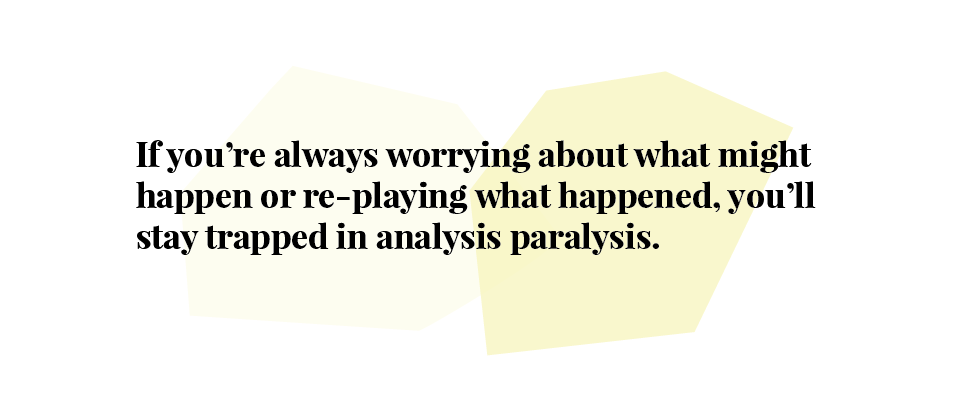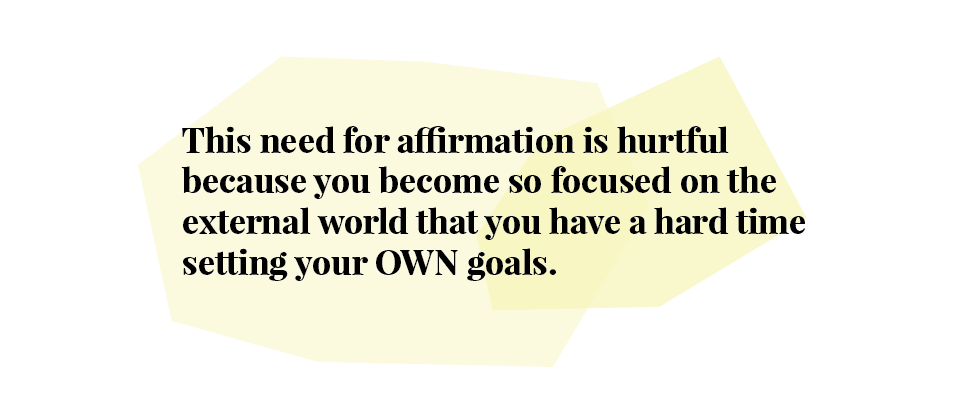Like so many of the ambitious women that I have worked with, Kate is always the first person at her desk.
She’s willing to volunteer for any task, and her plate always seems to be full. She’s kind, capable, on top of it and successful. At least that’s how she appears to the outside world.
Internally, from the moment Kate’s feet hit the floor, her mind is running a non-stop list of everything she needs to do that day. She’s always thinking about what comes next and trying to figure out the best way to handle any given situation.
Kate appears calm and collected, but behind the scenes, she’s in constant fight or flight mode, desperately trying to keep her insecurities and doubts at bay. Sound familiar?
What is High-Functioning Anxiety?
Kate has high-functioning anxiety.
When we envision anxiety, we usually think of someone who worries a lot, has regular panic attacks, or who is obsessive-compulsive. And yes, anxiety does have those symptoms. But some people have no outward signs of anxiety—and yet they are white-knuckling their way through life living the ‘never let them see you sweat’ mantra.
Kate and others like her have developed coping mechanisms that keep their anxiety at bay and make them appear to be high-functioning. Although they look like they have it all together, this
constant feeling of anxiety can keep them in a cycle of spinning out that prevents them from achieving their goals.
About 40 million adults deal with an anxiety disorder at any given time, according to the
National Institute of Mental Health (NIMH). Of these 40 million, approximately 18 percent of the population, some fall into this category of "high functioning"—essentially silent anxiety hidden behind a smile.
First, I want to introduce you to three characters that play an active role in anxiety that I use with my clients.
- Your Monger: This is the critical inner voice that has a running commentary on what you did wrong, how you could have done it differently, and what a failure you are. Her job is to keep you safe from failure. She motivates you by telling you, “Don’t make mistakes, don’t stand out, and don’t be too vulnerable.” If you break any of those rules, she uses shame, belittling, guilt, and negativity to keep you stuck.
- Your BFF: Your BFF enables you to rebel against the critical voice of your Monger. She’s the one who always has your back, is always willing to risk getting into trouble, and is always there to defend you. She’s always able to find justification and someone to blame. In her mind, responsibility, accountability, and restraint do not apply. Listening to her can feel awesome—and she can also be trouble.
- Your Biggest Fan: She’s the one who will help you achieve your goals and be happier. Your Biggest Fan is kind, generous, wise and always has your back. She’s the best of both worlds. She holds the goals of your Monger (to be safe and secure) without the shaming and belittling, and she provides the support of your BFF (“you are awesome”) without the free pass to do whatever you want.
Using these characters as a guide, let’s talk about the three things getting in your way of achieving your goals.
1. Overthinking
Did that go well? I can’t believe I said that? Did he take it the wrong way? Should I talk to him about it? What if I don’t get the promotion? What if I do?
On and on you go thinking about, analyzing, and re-living a singular encounter. Your Monger keeps you
stuck in a state of overthinking, which prevents you from moving forward and taking action on your goals. If you’re always worrying about what might happen or re-playing what happened, you’ll stay trapped in analysis paralysis.
How to move beyond it: Recognize when you’re doing this.
Notice when you’re just spinning out for no reason. Acknowledge what you’re feeling. Scared? Angry? Insecure? Acknowledging your feelings allows you to honor yourself. People with anxiety tend to ignore their feelings because feelings are NOT black and white and easily controlled. So simply label what you’re feeling.
Slow down and get into your body. Take a breath, dance, touch your toes—something to get you out of your head and into your body. Kindly pull back and see the big picture. Looking at the big picture, what is there to understand about this situation? Do you need to do something (apologize, re-visit it, take action) or do you need to let it go?
2. Tunnel Vision
Your Monger convinces you that the world operates in black and white. Because of this thinking, the Monger gives you many rules to how you SHOULD do life.
This thinking keeps you stuck in tunnel vision, which prevents you from seeing the big picture, recognizing new solutions and knowing whom to ask or where to go to for help.
Kate believes that a good person goes to college, picks a good major, studies hard,
finds a job related to their major, and works their way up to a high-paying job they love. Easy plan. Sounds doable. However, when she finds herself in her early 30s in a position she enjoys but isn’t high-paying, she’ll start to doubt herself. When you rely on good vs. bad thinking, you limit your options—and you limit your goals.
How to move beyond it: Challenge yourself to ‘add the and.’
The thought ‘I should be further along in my career. I am such a loser.’ becomes ‘I thought I would be further along in my career now AND I have learned a ton so far.’
Pull back and see the big picture. Come up with three alternatives to your current situation.
- I thought I would be further along in my career now and I was wrong. I have learned a ton, met a lot of people and in reality, I need to be patient and keep learning.
- It has been a lot harder than I thought it would be to get ahead. Maybe I need to get a mentor?
- I don’t even know if this is the right career for me. Perhaps I need to explore other options
3. Need for External Validation
One way to keep anxiety, insecurity, and doubt at bay is always to know and play by the rules. Our Monger gives us A LOT of rules, and people with anxiety are excellent rule followers.
Being a rule follower is one reason they’re so successful. They know the rules, AND they want to follow them. Where this backfires is the constant need for external validation. People with anxiety need constant affirmation to keep their inner insecurity and doubt at bay. This need for affirmation is hurtful because you become so focused on the external world that you have a hard time setting your own goals.
Your Monger tells you that, to experience success, you must follow the rules and do what others say. Knowing what you want and what your goals are can be challenging. Like so many of us, Kate has listened to the guidance of her teachers, parents, and bosses about where to go next in her career (they all love her, by the way). Now, she is questioning if this career is what she wants or what everyone else wants for her.
How to move beyond it: Start by building loyalty with yourself.
Be curious about what is important to you. What do you value? What activities do you enjoy? What articles or books do you like to read?
Notice how often you blindly follow what others tell you to do, even when making small decisions. Give yourself permission to explore your preferences.
Anxiety is more than just worrying. Anxiety encourages you to ignore yourself and your goals to remain comfortable. The irony is that existence is anything but comfortable. The constant overthinking, self-doubt, insecurity, and inability to love yourself is hard. However. there are many ways around it. Anxiety doesn’t have to turn the show.
You can take your life back. The first step is admitting that white-knuckling your way through the day and pretending you have it all together is not a way to live.













